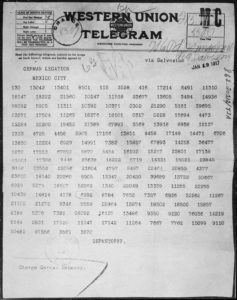
This telegram was sent by German Foreign Minister Arthur Zimmermann to the President of Mexico proposing a military alliance against the United States. In return for Mexican support in the war, Germany would help Mexico regain New Mexico, Texas, and Arizona from the United States. The British intercepted the secret message, deciphered it, and turned it over to the U.S. Government.
(U. S. National Archives and Records Administration)
Berlin, January 19, 1917
On the first of February we intend to begin submarine warfare unrestricted. In spite of this, it is our intention to endeavor to keep neutral the United States of America. If this attempt is not successful, we propose an alliance on the following basis with Mexico: That we shall make war together and together make peace. We shall give general financial support, and it is understood that Mexico is to reconquer the lost territory in New Mexico, Texas, and Arizona. The details are left to you for settlement. You are instructed to inform the President of Mexico of the above in the greatest confidence as soon as it is certain that there will be an outbreak of war with the United States and suggest that the President of Mexico, on his own initiative, should communicate with Japan suggesting adherence at once to this plan; at the same time, offer to mediate between Germany and Japan. Please call to the attention of the President of Mexico that the employment of ruthless submarine warfare now promises to compel England to make peace in a few months.
Zimmerman (Secretary of State)
Pretty scary, no? This is the decoded and translated telegram that the British Foreign Office in London intercepted in late January 1917. Sent by German Secretary of State Arthur Zimmerman to the German Minister to Mexico, Heinrich von Eckhardt with the full support of the German government, the telegram offered the Mexican government portions of the United States lost in the Mexican War of 1846-1848, almost seventy years before. Germany would finance a war between Mexico and the United States, a conflict that had been on going for some time.
Mexico could set the terms, but Zimmerman strongly suggested that a peaceful agreement between Germany and Japan could also be brokered by Mexico.
When Germany began unrestricted submarine warfare to break the British naval blockade of German ports, they felt they would quickly destroy both Great Britain and France, the strongest members of the Allied forces. At that point, the United States severed diplomatic ties with Germany. Germany’s greatest fear was the entry of the United States into the war.
Great Britain waited until February 24 to release the message to President Woodrow Wilson. Americans learned of it on March 1. Needless to say, most Americans felt threatened, angry, and demanded Congress declare war with Germany. On April 6, 1917, the United States Congress, with support of President Woodrow Wilson signed the Declaration of War.
David Kahn, author of The Codebreakers (Simon & Schuster, 1967, 1996 revised) believed “that no other cryptanalysis has had such enormous consequences; that never before or since has so much turned upon the solution of a secret message.”
How Great Britain managed to decipher the German code is fascinating and very complicated. World War I historian Barbara Tuchman wrote an easier read in The Zimmerman Triangle (Ballantine Books, 1985). Either book tells a terrific story.
